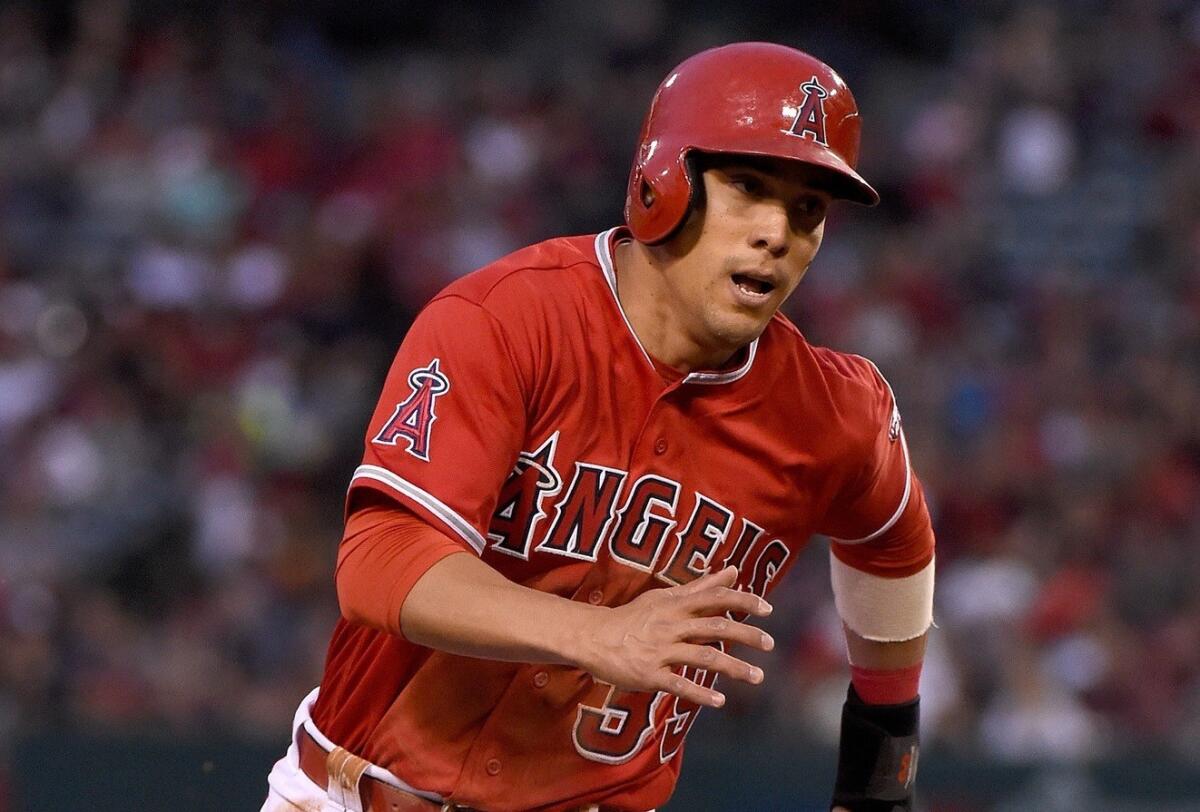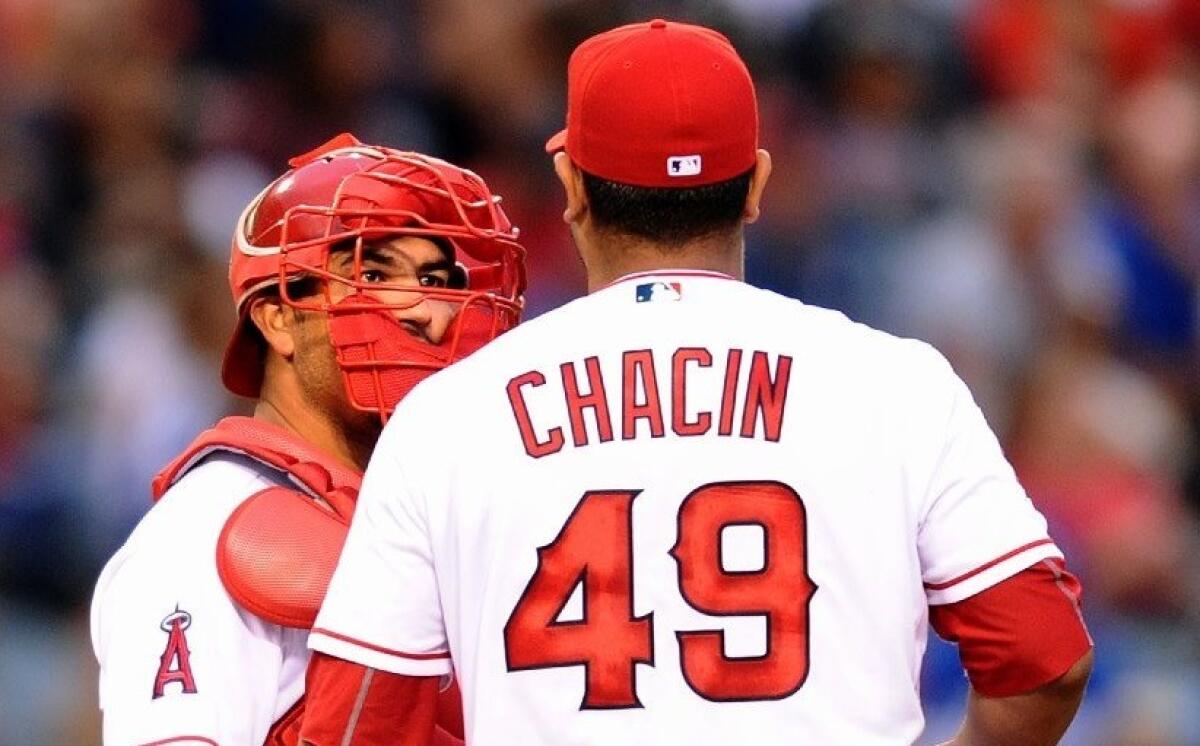Column: Venezuelan players on the Angels try not to focus on the chaos in their homeland

Angels outfielder Rafael Ortega races home to score during the second inning of a game on May 20.
- Share via
Rafael Ortega waited a lifetime for this opportunity, to be in the Angels lineup on nearly a daily basis alongside the likes of Mike Trout and Albert Pujols.
Ortega, a 24-year-old outfielder, had played in only two major league games before this season. Promoted from triple A as a temporary replacement for the injured Daniel Nava, his situation is similar to that of many rookies; his objective is to play well enough to move closer to becoming a full-time player at this level.
If it were only that simple.
See the most-read stories in Sports this hour>>
Ortega’s homeland of Venezuela is in upheaval. The socialist nation has fallen into chaos in the wake of president Hugo Chavez’s death in 2013. Every day, Ortega reads and hears about the political conflict and violence that has pushed the country toward the brink of collapse.
“It’s hard to concentrate here, but you have to go forward,” Ortega said in Spanish. “When you cross that line, when you step on that field, you have to concentrate on your work. It’s what gives you food. It’s what feeds your family. It’s what determines your future.”
Ortega isn’t alone. There are four other Venezuelans on the Angels roster: shortstop Gregorio Petit, catcher Carlos Perez, reliever Jose Alvarez and recently acquired starting pitcher Jhoulys Chacin.
While their significant others and children are in the United States, there are plenty of other people back home who they worry about.
“We have some family here — our wives, our children, if we have children — but the majority of our families are back home,” Ortega said.
Each of the Angels players described the hopelessness they feel when they hear about the latest troubling developments from home.
Perez said he speaks to his parents every day by phone, but added, in Spanish, “You can’t really help.”
Food and other essentials are hard to come by.
“The people who suffer the most are in the outer parts of the country,” Alvarez said in Spanish. “Things don’t always get distributed there.”
Alvarez is from Barcelona, a coastal town that is about a four-hour drive from Caracas, the nation’s capital. His father takes a heart medication that is often unavailable. When it can be found, it’s expensive.

Angels pitcher Jhoulys Chacin (49) talks with catcher Carlos Perez during a game on May 19 at Angel Stadium
Perez said his parents, who live in Valencia, have to wait in hours-long lines to buy food.
The food that is available is expensive as a result of hyperinflation, something Ortega saw firsthand when he returned to his hometown of El Tigre over the winter. Ortega said he the price of bread was eight times higher than it was only a couple of years ago.
“It’s out of control,” Ortega said.
The players do what they can to help. Each sends care packages that include shampoo, soap, toilet paper and other increasingly scarce items.
The environment has become particularly dangerous in recent months. Last week in Caracas, a man was burned alive for allegedly stealing $5.
The threat of violence isn’t something that unique to the capital.
“Regrettably, violence is something that affects the entire country,” Petit said in Spanish. “There are very few who avoid that reality.”
The players said they were particularly careful when they returned home in the off-season because their fame and relative wealth could make them targets. Washington Nationals catcher Wilson Ramos was kidnapped while visiting Venezuela after the 2011 season.
“Many baseball players have been robbed and threatened when they’ve left their houses,” Chacin said in Spanish. “You have to be with someone and you can’t be in the same place for too long.”
Even when the players are in the United States, their family members take similar precautions.
Venezuela is the rare South American country in which baseball is the national sport instead of soccer. Alvarez and Perez wondered how Venezuela’s problems could affect the game. The country’s winter league is popular among up-and-coming major leaguers; Dodgers outfielder Joc Pederson played there as recently as 2013.
Major League Baseball has already scaled back its operations in the country. The Angels and Dodgers don’t have academies there and several other teams have joined them in recent years, shutting down player-development complexes.
If the steady stream of bad news has affected the Venezuelan players on the Angels, Manager Mike Scioscia hasn’t seen it.
Scioscia sounded sympathetic, saying, “It’s difficult to filter those distractions and keep your mind on what you need to do. Those real-life experiences are more important than whatever you’re doing here.
“But I think our guys have a good foundation. They’re staying focused. I think it’s a release for them to come here and play.”
Petit phrased it another way: “This is my job. I can’t lose it because of what’s happening in my country.”
Petit hopes that by performing well, he could play a small part in repairing Venezuela’s image.
“This is one way for our country to maintain some sort of status, to not be known only for bad news,” Petit said.
Relayed Petit’s words, Ortega nodded, then sighed.
“It’s difficult,” he said. “We might be able to give them a moment of joy, but that won’t fix the situation.”
Follow Dylan Hernandez on Twitter @dylanohernandez
Go beyond the scoreboard
Get the latest on L.A.'s teams in the daily Sports Report newsletter.
You may occasionally receive promotional content from the Los Angeles Times.




